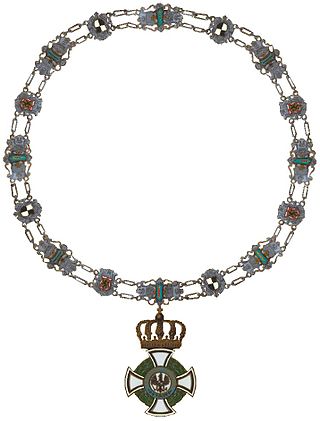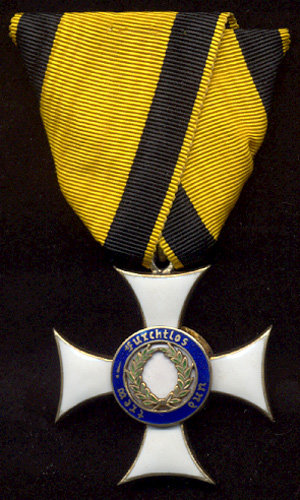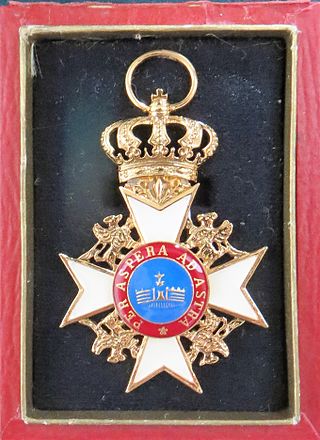This article needs additional citations for verification .(February 2024) |
This is a list of notable events from the year 1716 in Russia .
This article needs additional citations for verification .(February 2024) |
This is a list of notable events from the year 1716 in Russia .

The Order of Saint Andrew the Apostle the First-Called is the highest order conferred by both the Russian Imperial Family and by the Russian Federation . Established as the first and highest order of chivalry of the Russian Tsardom and the Russian Empire in 1698, it was removed from the honours system under the USSR before being re-established as the top Russian civil and military order in 1998.

A Generaloberst was the second-highest general officer rank in the German Reichswehr and Wehrmacht, the Austro-Hungarian Common Army, the East German National People's Army and in their respective police services. The rank was equal to a four-star full general but below a general field marshal. The rank was equivalent to a Generaladmiral in the Kriegsmarine until 1945 or to a Flottenadmiral in the Volksmarine until 1990. It was the highest ordinary military rank and the highest military rank awarded in peacetime; the higher rank of general field marshal was awarded only in wartime by the head of state. In general, a Generaloberst had the same privileges as a general field marshal.

Leopold succeeded in 1830 as the Grand Duke of Baden, reigning until his death in 1852.

The Order of the Black Eagle was the highest order of chivalry in the Kingdom of Prussia. The order was founded on 17 January 1701 by Elector Friedrich III of Brandenburg. In his Dutch exile after World War I, deposed Emperor Wilhelm II continued to award the order to his family. He made his second wife, Princess Hermine Reuss of Greiz, a Lady in the Order of the Black Eagle.

The Order of the Redeemer, also known as the Order of the Saviour, is an order of merit of Greece. The Order of the Redeemer is the oldest and highest decoration awarded by the modern Greek state.

The Imperial Order of Saint Alexander Nevsky was an order of chivalry of the Russian Empire first awarded on 1 June [O.S. 21 May] 1725 by Empress Catherine I of Russia.

Karl Anton, Prince of Hohenzollern-Sigmaringen was the last prince of Hohenzollern-Sigmaringen before the territory was annexed by the Kingdom of Prussia in 1849. Afterwards he continued to be titular prince of his house and, with the death of the last prince of Hohenzollern-Hechingen in 1869, of the entire House of Hohenzollern. He served as Minister President of Prussia from 1858 to 1862, the only Hohenzollern prince to hold the post. His second son, Karl, became king of Romania. The offer of the throne of Spain to his eldest son, Leopold, was one of the causes of the Franco-Prussian War, which led to the unification of Germany and the creation of the German Empire.

The House Order of Hohenzollern was a dynastic order of knighthood of the House of Hohenzollern awarded to military commissioned officers and civilians of comparable status. Associated with the various versions of the order were crosses and medals which could be awarded to lower-ranking soldiers and civilians.

The House of Habsburg-Lorraine originated from the marriage in 1736 of Francis III, Duke of Lorraine and Bar, and Maria Theresa of Austria, later successively Queen of Bohemia, Queen of Hungary, Queen of Croatia and Archduchess of Austria. Its members are the legitimate surviving line of both the House of Habsburg and the House of Lorraine and inherit their patrimonial possessions from their female line of the House of Habsburg and from the male line of the House of Lorraine.

The Order of Saint Stephen is an order of chivalry founded in 1764 by Maria Theresa. In 1938, Miklós Horthy took the rights and activities of Grand Master as Regent of Hungary. The name of the Order changed to the Royal Hungarian Order of Saint Stephen. The Order was terminated at the time of the proclamation of the Second Hungarian Republic in 1946. It was recreated in 2011 as the Hungarian Order of Saint Stephen, and to this day remains the highest order in Hungary.

The Military Merit Cross (Militärverdienstkreuz) was established by Friedrich Franz II, Grand Duke of Mecklenburg-Schwerin on August 5, 1848. Mecklenburg-Schwerin, a grand duchy located in northern Germany, was a member of the German Confederation and later the German Empire.

The House and Merit Order of Duke Peter Frederick Louis or proper German Oldenburg House and Merit Order of Duke Peter Frederick Louis was a civil and military order of the Grand Duchy of Oldenburg, a member state of the German Empire. The order was founded by Grand Duke Augustus of Oldenburg on 27 November 1838, to honor his father, Peter Frederick Louis of Oldenburg. It became obsolete in 1918 after the abdication of the last grand duke.

The Military Merit Order (Militärverdienstorden) was a military order of the Kingdom of Württemberg, which joined the German Empire in 1871. The order was one of the older military orders of the states of the German Empire. It was founded on 11 February 1759 by Karl Eugen, Duke of Württemberg as the Militär-Carls-Orden, and was renamed the Militärverdienstorden on 11 November 1806 by King Friedrich I. The order underwent several more revisions over the course of the 19th and early 20th centuries. It became obsolete with the fall of the Württemberg monarchy in the wake of Germany's defeat in World War I.

Karl Leopold of Mecklenburg-Schwerin was Duke of Mecklenburg-Schwerin from 1713 to 1747.

The Order of St Alexander was the second highest Bulgarian order during the Kingdom of Bulgaria. It was established by Knyaz Alexander I and named after his patron saint.

The House Order of Albert the Bear was founded in 1836 as a joint House Order by three dukes of Anhalt from separate branches of the family: Henry, Duke of Anhalt-Köthen, Leopold IV, Duke of Anhalt-Dessau, and Alexander Karl, Duke of Anhalt-Bernburg.

The House Order of the Wendish Crown is a dynastic order that was jointly instituted on 12 May 1864 by Grand Duke Friedrich Franz II of Mecklenburg-Schwerin and Grand Duke Friedrich Wilhelm of Mecklenburg-Strelitz. It is the oldest and most senior order of the House of Mecklenburg.

Leopold Karl von Kollonitsch or Lipót Kollonich was a cardinal of the Holy Roman Church, Archbishop of Kalocsa and later of Esztergom, and Primate of Hungary. Also a count of the Holy Roman Empire, he was a leading figure of the Hungarian Counter-Reformation.

The Order of Merit of Philip the Magnanimous was an order of chivalry established by Louis II, Grand Duke of Hesse on 1 May 1840, the name day of Philip I, Landgrave of Hesse, in his honour to award extraordinary military or civil merit. It was the second-highest order of the Grand Duchy of Hesse before 1876, when it was displaced to third by the revived Order of the Golden Lion, the former paramount order of the Electorate of Hesse.